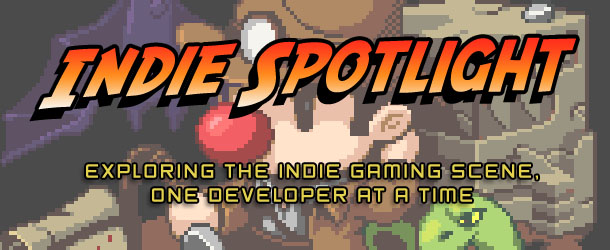
Contrary to popular belief, games don't always need huge budgets and teams of hundreds of worker drones toiling away under the watchful eye of whip-wielding overlords in order to be awesome. The thriving indie development scene continues to give birth to some of the weirdest, coolest, and most innovative games around. Indie Spotlight pulls back the curtain, taking a closer look at the world of independent game developers and the magic they make.
An Emotional Journey
Though many great things come from small studios driven by independent, creative minds, the world of indie game development isn't all sunshine, lollipops, and puppies. Sometimes you have to scrap everything and start over again. Other times, you have to burn the house down or kick the baby to make things work. Even then, success isn't guaranteed. Yes, game development has its dark side. Alec Holowka has sipped from its glistening black waters, and found that the swirling energies imbued within provide a certain malevolent coal that fuels his own creative spark.
Like other indie studios, Infinite Ammo is a small operation, which Holowka founded to make the games he wanted to create. One of his first major projects was Aquaria -- a collaboration with Derek Yu that won the grand prize in the 2007 Independent Games Festival. Since completing that hit title, Infinite Ammo has collaborated on a number of smaller games with other indie developers, and the studio's skeleton crew (which largely consists of Holowka, his girlfriend Chrissy, and artist Ashley Dumonchelle) is hard at work on its next big project.

The process of developing a game independently has its ups and downs, says Holowka, who tempers his enthusiasm and love for making games with the reality of how taxing it can be. "It kind of sucks, because to make things on a big enough scale while you're trying to create a bunch of the pieces yourself means you don't really have a life," he says. "You have to sign your soul over to the game, and hope it pans out in the end. While you're waiting and hoping, you also have to constantly work your ass off. It feels horrible and wonderful at the same time."
Being able to make the kinds of games you want to make is all fine and good, but creative constraint is also a very important piece of the puzzle, Holowka says. "The infinite canvas can become a bottomless pit really quickly," he warns. "The challenge is to come up with something that you think is true to yourself, while also making something that other people can get on board with." Even when you manage to hit the target creatively, seeing it through to fruition can be one of the biggest challenges.
Infinite Ammo's next major game-in-progress, Marian and the Fantastic World of Dreams, is a dark and beautiful concept game about a young marionette named Marian who comes to life, escapes captivity, and sets out into a strange world. It's a game that deals with themes of relationships, identity, and emotional mood swings; Holowka notes that his games often resonate with emotional elements found in his own life. Beyond Marian's thematic aspect, the process of developing the game itself has been a bit of an emotional rollercoaster ride for the team. The original plan was to make Marian a 3D game, and the team spent many months (and a lot of money) to build the game in that format, yielding an interesting prototype that ultimately didn't pan out the way Holowka had hoped. After spending so much time and energy on making the game in 3D, he made the tough call to scrap much of the finished work and switch over to 2D. Despite all the heartache, it turned out to be the spark that reignited Holowka's passion for the project.

"In the case of Marian, 2D adds a lot to the charm of the game," he says. "What I realized, by coming to this decision, is that I really, really love 2D. It gives me the warm fuzzies in a way that 3D can't, especially when you have a unique artist like Ashley Dumonchelle at the helm." In both the major 2D and 3D versions of the game, the gameplay revolves closely around the relationship between Marian and her puppet strings, he explains. The change to 2D transformed this relationship from a complicated system that was challenging to work with, to a simpler concept that's a lot more enjoyable to use. The game still has quite a ways to go before it's completed, though Holowka feels it's back on track.
"Indie game development is a huge risk," says Holowka. "Some people might not be able to understand this, but investing a lot of time in something isn't free. Time gets eaten up; money will be around long after you're dead and buried. The real risk is that you will fail. You won't finish your dream game, or you will and it'll suck. But if you can finish something, and it manages to find its way into the hands of people who love it... that's all you, baby. One of the best ways to sleep easy at night is to know that you've worked your hardest and that someone appreciates the effort."
Nathan Meunier is a freelance writer and indie gaming enthusiast who likes his pixels jaggy and his tunes blippy. He writes about video games and geek/gaming culture for GameSpy, IGN, Nintendo Power, GamePro, and many other fine publications. See what he's up to at NathanMeunier.com.


